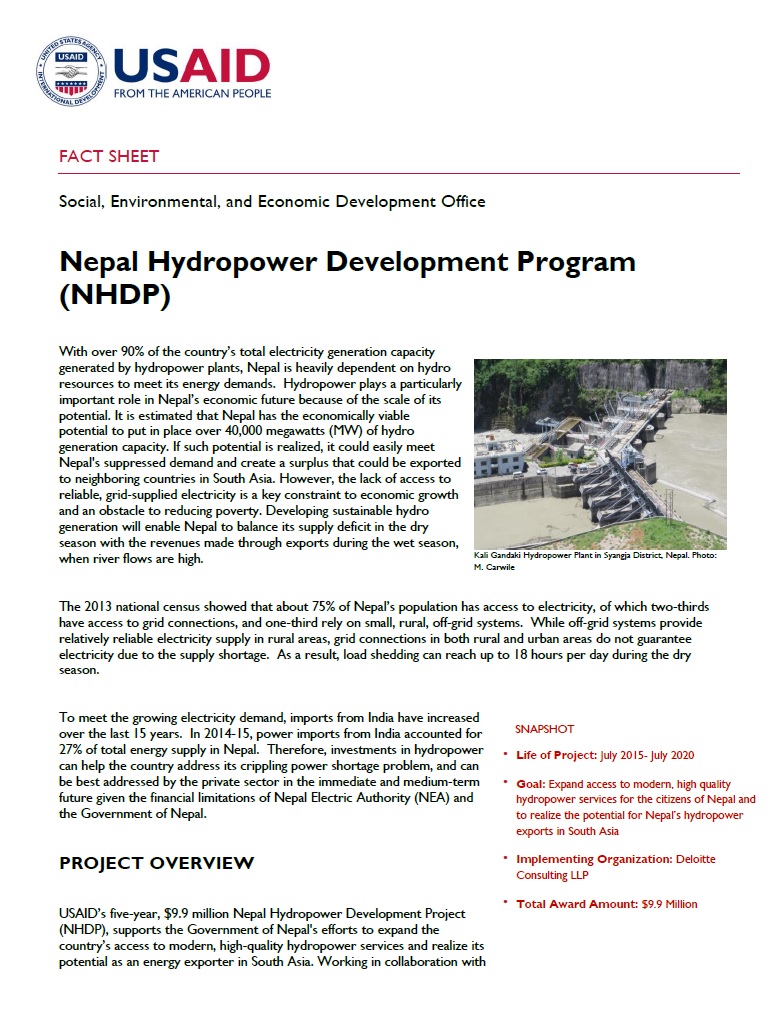With over 90% of the country’s total electricity generation capacity generated by hydropower plants, Nepal is heavily dependent on hydro resources to meet its energy demands. Hydropower plays a particularly important role in Nepal’s economic future because of the scale of its potential. It is estimated that Nepal has the economically viable potential to put in place over 40,000 megawatts (MW) of hydro generation capacity. If such potential is realized, it could easily meet Nepal's suppressed demand and create a surplus that could be exported to neighboring countries in South Asia. However, the lack of access to reliable, grid‐supplied electricity is a key constraint to economic growth and an obstacle to reducing poverty. Developing sustainable hydro generation will enable Nepal to balance its supply deficit in the dry season with the revenues made through exports during the wet season, when river flows are high.
The 2013 national census showed that about 75% of Nepal’s population has access to electricity, of which two-thirds have access to grid connections, and one-third rely on small, rural, off-grid systems. While off‐grid systems provide relatively reliable electricity supply in rural areas, grid connections in both rural and urban areas do not guarantee electricity due to the supply shortage. As a result, load shedding can reach up to 18 hours per day during the dry season.
To meet the growing electricity demand, imports from India have increased over the last 15 years. In 2014-15, power imports from India accounted for 27% of total energy supply in Nepal. Therefore, investments in hydropower can help the country address its crippling power shortage problem, and can be best addressed by the private sector in the immediate and medium-term future given the financial limitations of Nepal Electric Authority (NEA) and the Government of Nepal.
PROJECT OVERVIEW
USAID’s five-year, $9.9 million Nepal Hydropower Development Project (NHDP), supports the Government of Nepal's efforts to expand the country’s access to modern, high-quality hydropower services and realize its potential as an energy exporter in South Asia. Working in collaboration with the Investment Board of Nepal (IBN), the NEA, and the Ministry of Energy (MOE), the project will help Nepal facilitate and encourage private sector investment in hydropower in an environmentally and socially sustainable manner. The project provides assistance to areas such as project appraisal, design and issuance of power purchase and other project agreements, and assistance of transactional advisors to review and evaluate the pipeline of hydropower generation and transmission projects. The project will also support the Government of Nepal in transforming the energy sector to create viable and efficient national power services and promote electricity trade between Nepal and India.
PROJECT ACTIVITIES
- Provide advisory support to facilitate the development and financial closure of contracts for large hydroelectricity projects
- Provide a full-time legal advisor to the IBN and available to the MOE and the NEA
- Provide financial advisors to the IBN who are also available to work with the MOE and the NEA on key transactions
- Provide support to the IBN and the MOE to ensure effective public outreach and communications to garner support for hydropower projects
- Provide targeted short-term assistance directed to help resolve specific constraints affecting the ability of priority projects to reach financial closure
- Provide advisory support to the MOE and the NEA with designing and implementing targeted electricity sector reforms
- Support the Government of Nepal in implementing policy and institutional reforms that address the many challenges in the sector, including poor quality of electricity service and high losses
- Contribute to the successful restructuring of the NEA
- Lay the foundation for viable public private partnerships in electricity trading, and possibly in transmission, generation, and distribution
EXPECTED OUTPUTS
The expected long-term results of the NHDP Project are as follows:
- Improved economic growth, job creation, and quality of life
- Strengthened economic relationships between Nepal and its neighboring countries, and an improved balance of payments due to energy exports
- Greater energy security due to enhanced domestic generating capacity and integration with the Indian market
- A lower carbon generation future for both India and Nepal








Comment
Make a general inquiry or suggest an improvement.